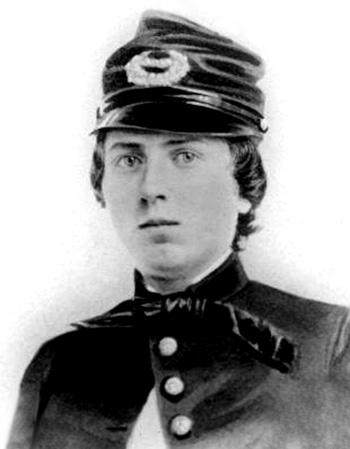Alonzo Cushing was born on January 19, 1841, in Delafield, Wisconsin. He entered the U.S. Military Academy at West Point on July 1, 1857, and was commissioned a 1st Lt of Artillery on June 24, 1861. During the Civil War, he participated in the Battle of Fredericksburg in December 1862, the Battle of Chancellorsville in April and May 1863, and the Battle of Gettysburg in July 1863. He received a Brevet promotion to Major after the Battle of Chancellorsville, and he commanded Battery A of the 4th U.S. Artillery at Gettysburg, where he was Killed in Action on July 3, 1863. Cushing received a posthumous Brevet Promotion to Lieutenant Colonel after his death, and he was buried at the West Point Cemetery at the U.S. Military Academy. Over 151 years after his death, LTC Cushing became the last participant of the American Civil War to be awarded the Medal of Honor, on November 6, 2014.
His Medal of Honor Citation reads:
First Lieutenant Alonzo H. Cushing distinguished himself by acts of bravery above and beyond the call of duty while serving as an artillery commander in Battery A, 4th U.S. Artillery, Army of the Potomac at Gettysburg, Pennsylvania on July 3rd, 1863 during the American Civil War. That morning, Confederate forces led by General Robert E. Lee began cannonading First Lieutenant Cushing’s position on Cemetery Ridge. Using field glasses, First Lieutenant Cushing directed fire for his own artillery battery. He refused to leave the battlefield after being struck in the shoulder by a shell fragment. As he continued to direct fire, he was struck again — this time suffering grievous damage to his abdomen. Still refusing to abandon his command, he boldly stood tall in the face of Major General George E. Pickett’s charge and continued to direct devastating fire into oncoming forces. As the Confederate forces closed in, First Lieutenant Cushing was struck in the mouth by an enemy bullet and fell dead beside his gun. His gallant stand and fearless leadership inflicted severe casualties upon Confederate forces and opened wide gaps in their lines, directly impacting the Union force’s ability to repel Pickett’s charge. First Lieutenant Cushing’s extraordinary heroism and selflessness above and beyond the call of duty at the cost of his own life are in keeping with the highest traditions of military service and reflect great credit upon himself, Battery A, 4th U.S. Artillery, Army of the Potomac, and the United States Army.
|



